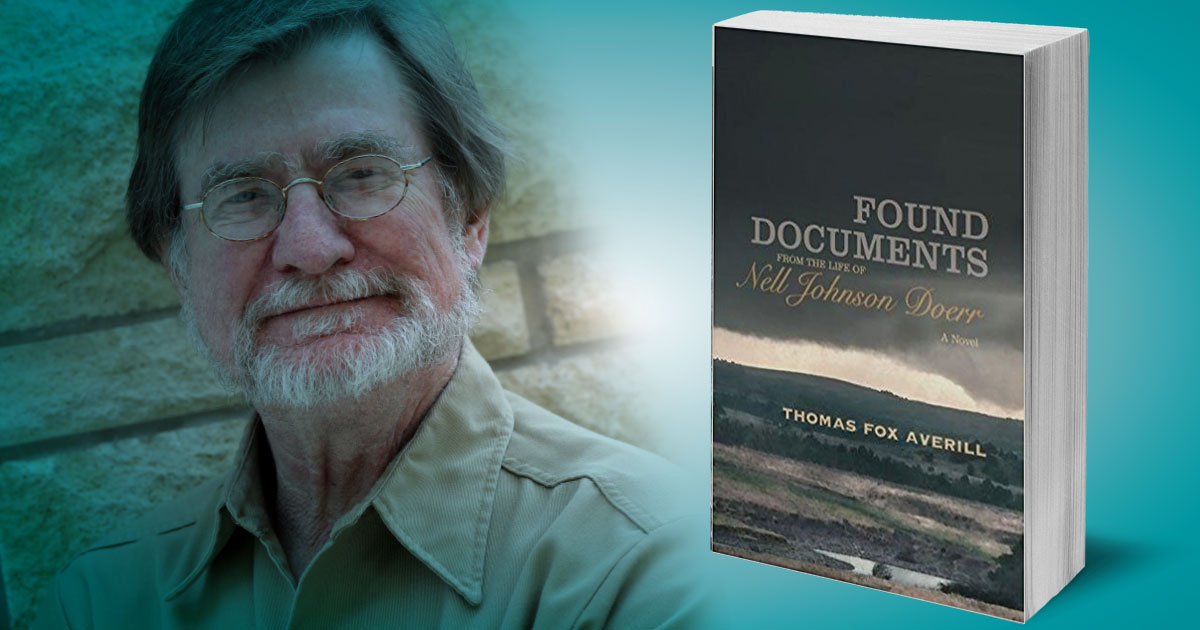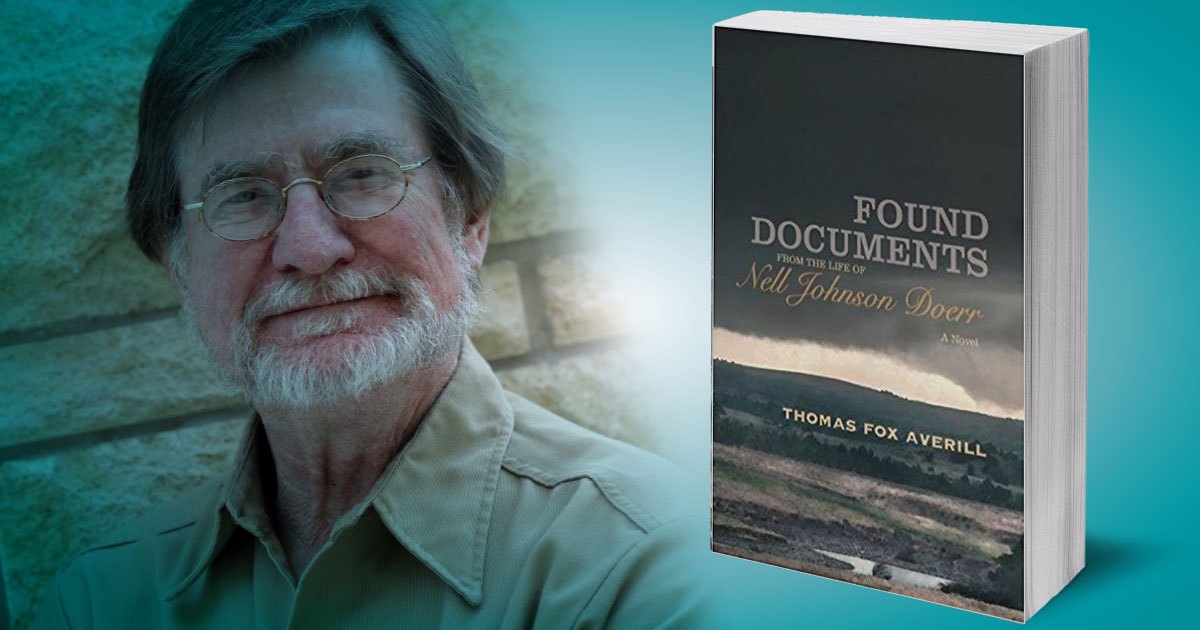Featured Author - Thomas Fox Averill

Thomas Fox Averill’s newest novel is rich in history, rooted in Kansas soil and driven by a strong female voice. Found Documents from the Life of Nell Johnson Doerr is fiction that rings of truth. It is a story told entirely through journals, letters, photos, drawings, notes and clippings left behind by Nell Doerr, who lived in Lawrence, Kansas, between 1854 and 1889. Nell moves to Kansas with her husband, an abolitionist working on the underground railroad. Nell has already lost two babies, and she loses her husband in Quantrill’s Raid. After so much loss she finds comfort in finding fossils and the pursuit of scientific knowledge. Through the documents Nell left behind, we get to know a resourceful, willful woman who bucks the conventions of her time to contribute her knowledge to the scientific record. Readers will get to know Nell, even as she finds herself through her work and the human relationships she builds over the years.
Averill said several things drew him to write this book as “archival fiction,” a collection of found documents instead of a narrative story.
“I've always liked including documents in my fictional work, so this extended that idea,” Averill said. “Also, by writing in Nell's ‘written’ voice, I could feel almost as though I were transcribing, rather than writing. The letters and diaries in any archive have an audience--the self or the person being written to--and that made it easier to find Nell's voice. Finally, with a long time span to cover, I didn't want to have to worry about writing the kinds of transitional narrative elements that signal a move through time--I could just present ‘slices’ of time.”
Fans of Averill’s work will also be interested to know that there is a connection between this book and his 2011 novel rode. I was delighted to find out that Averill carried on the story of a character from that book.
“Nell is the baby that Robert and Jo Johnson, the main characters of rode, find in a smoldering cabin on the Hatchie River—her mother has died protecting her, and her father, an unlikable ferry man, has been hung,” Averill said. “Robert and Jo are on the run, so they take the baby, and Jo, who just lost her own pregnancy to stillbirth, is able to nurse her. They adopt her, and name her Nell. I moved her with her husband Solomon Doerr to Kansas in 1854, to help on the Underground Railroad, as her parents did in Arkansas…”
You can meet Averill and hear more about his new book here at the library on February 11, from 2-3 pm.
Check in on the Facebook event to add this event to your calendar and get updates.
Read on for my interview with the author and links to Averill’s work in our library collection.
An Interview with Thomas Fox Averill, January 2018
I just finished reading Found Documents and I just loved it. I think it may be my favorite of your books, and part of that is the strong female protagonist. Were you channeling some of the strong women in your life when you wrote Nell’s character?
My spouse, Jeffrey Ann Goudie, for her honesty, integrity, curiosity, and persistence of and insistence upon truth. My grandmother, Elizabeth Averill, and Jeffrey’s grandmother, Hollie Francis, were both strong women, survivors. My grandmother was a letter writer. My own mother, Tucker, and my sister, Libby Rosen, were/are also truth tellers, not afraid of facts and change. I dedicated the book to my other family, the Goudies, because of their support, and because Jeffrey’s father was a geologist with a great fossil collection.
There’s a connection between this book and your 2011 novel rode. Can you tell us a bit about that?
Nell is the baby that Robert and Jo Johnson, the main characters of rode, find in a smoldering cabin on the Hatchie River—her mother has died protecting her, and her father, an unlikable ferry man, has been hung. Robert and Jo are on the run, so they take the baby, and Jo, who just lost her own pregnancy to stillbirth, is able to nurse her. They adopt her, and name her Nell. I moved her with her husband Solomon Doerr to Kansas in 1854, to help on the Underground Railroad, as her parents did in Arkansas, and then Solomon is killed in Quantrill’s Raid in 1863. Nell finds herself in a smoldering house, in the basement with the foundation rock. She studies it, and sees fossils, those things once dead but somehow still living. She must understand them, and this pursuit shapes the rest of her life, one of rescue, discovery and finding/being found.
This book is rich with history, mostly focused on Kansas. As a connoisseur of all things Kansas, you were no doubt already very familiar with our timeline. Did you make any new discoveries about Kansas history in the course of your research?
Besides concentrating more heavily on Lawrence--during Nell's years there from 1854-1890, and how the town grew, how it memorialized Quantrill's raid, and who was at Kansas University then--I learned new things about science in our state, and historical figures like Hugh Cameron, the Kansas Hermit, and Benjamin Mudge, our first state geologist. Interestingly, Mudge came first to Quindaro, Kansas, along the Missouri River, and was an abolitionist lawyer who then became, like Nell, interested in the natural world.
I love that this book incorporates sketches, newspaper clippings and different types of personal writing. What made you decide to structure this novel as a collection of found documents?
Several things drew me to archival fiction. I've always liked including documents in my fictional work, so this extended that idea. Also, by writing in Nell's "written" voice, I could feel almost as though I were transcribing, rather than writing. The letters and diaries in any archive have an audience--the self, or the person being written to--and that made it easier to find Nell's voice. Finally, with a long time span to cover, I didn't want to have to worry about writing the kinds of transitional narrative elements that signal a move through time--I could just present "slices" of time.
At one point Nell’s pet parrot escapes. Nell sees her high in a tree, gorging on cherries, and calls the bird “an Eve who would gain no knowledge.” In another part of the book, Nell compares herself to Hester Prynne, of The Scarlet Letter, noting that she has been ostracized from her community for wanting to know and learn, just as Hester was ostracized for having a child out of wedlock. Can you share a few thoughts on the theme of judgment and censure against women? Did you make a decision to include this theme, or was it organic to the story? Is this issue still relevant to today’s readers, 175 years later?
I made no conscious decision about these themes of censure and judgement. Women were, and still are, harshly judged when seen as too independent. Nell is compelled to find fossils and she goes against the convention that women should not wander alone, but be accompanied; that she should not act on her own without the authority of men, hence her trouble with bankers and railroad shipments; that she should not think on her own, especially against the conventions of religion. We are still in a fight for science and fact, just as Nell was, as we battle against those still suspicious of evolution and the science of climate change. So though I was not trying to be political in this book, I certainly was aware of the ongoing battles for common sense, for science, for fact and for women's independence.
I know this book has been years in the making and now that it’s about to launch you’re probably already at work on the next novel. Can you give us a hint of what we have to look forward to next?
I'm still noodling with some ideas I have about baseball and have something set in the future. Whether anything will come of it, I can't now say. I have to write until I either find my way or reach a dead end. Here's to a way in!













